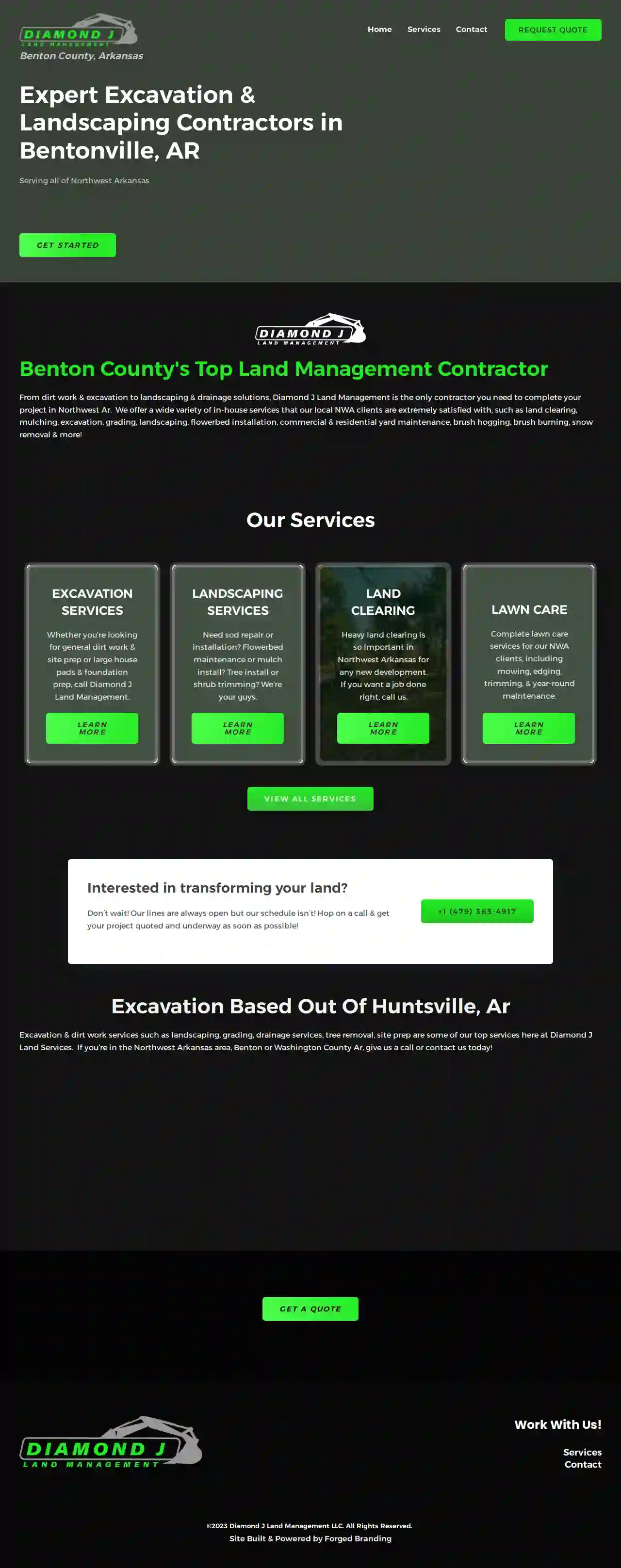Excavation Contractors Arkansas
Find the best Excavating Contractor in Arkansas
Receive 3 FREE Excavation Companies quotes for your project today! Compare profiles, reviews, accreditations, portfolio, etc... and choose the best offer.

Lukas Excavation and Demolishing
53 reviewsHot Springs, USAbout Us Licensed And Insured We are a State Licensed Excavation Contractor in Arkansas and Professionally Insured which puts us into the seat of responsibility and requires professionalism for every job we do. Prompt and Reliable We follow Arkansas State Laws and Industry Guidelines as a Licensed Excavation Contractor to complete your job promptly and reliably. We check with all Arkansas underground utility service providers before we dig to assure safety to ourselves and our customers. Satisfaction Guaranteed We strive to do every job as if we were the customer so there is complete satisfaction when the job is done. We provide excavation services in Montgomery County, Yell County, Hot Springs County, Pulaski County, Polk County, Saline County, Garland County, Pike County, Arkansas, Hot Springs, Hot Springs Village, Little Rock, North Little Rock, Malvern, Sims, Story, Mt. Ida, Mena, Russellville, Benton, Bryant, Bismarck, Maulmelle, Sherwood, Booneville, Danville, Searcy, Conway, Pine Bluff, Sheridan and many other cities within Arkansas.
- Services
- Why Us?
- Gallery
Get Quote
GNG Underground
57 reviewsRogers, USWelcome to GNG Underground Professional Excavation, Utility Trenching, and Landscaping Services for Northwest Arkansas Safety & Quality Service, Always our Priority Serving all of Northwest Arkansas Welcome to GNG Underground, providing experienced excavation and landscaping services for NWA GNG is a Veteran-Owned excavation company, based in Bella Vista and serving all of Northwest Arkansas GNG Underground is a multi-faceted excavating and landscaping company in Northwest Arkansas. From clearing land for your new project to installing storm shelters and septic tanks and propane tanks, GNG has you covered. We are your go-to outdoor utility company. We take pride in the quality of our work and the projects we complete for our clients. We offer a wide variety of outdoor excavation services in Northwest Arkansas so that when you need something done on your property, you know that you can call the trusted excavators at GNG Underground.
- Services
- Why Us?
- Gallery
Get Quote
Les Rogers Excavating & Materials
3.834 reviews1000 Wellington Rd, Stratford, N0B 2L0, USAbout Les Rogers Inc. Les Rogers Inc. is a family-owned and operated business with over 30 years of experience in the construction industry. We are committed to providing our clients with high-quality workmanship and exceptional customer service. Our team of skilled professionals is dedicated to delivering projects on time and within budget. We specialize in a wide range of construction services, including: Residential construction Commercial construction Renovations Additions Custom homes At Les Rogers Inc., we believe in building strong relationships with our clients. We take the time to understand your needs and goals, and we work closely with you throughout the entire construction process. We are committed to providing you with a positive and stress-free experience. Contact us today to learn more about our services and to schedule a free consultation.
- Services
- Why Us?
Get Quote
Diamond J Land Management
1Rogers, US- Services
- Why Us?
Get Quote
Arrow Dirt Works
511 reviewsRogers, US- Services
- Why Us?
Get Quote
Over 3,943+ Excavation Contractors on our directory
Our excavation pros operate in Arkansas and beyond!
ExcavationHQ has curated and vetted Top Excavation Companies in Arkansas. Find a top & trustworthy pro today.
Frequently Asked Questions About Excavation Contractors
- Utility Locates: Contact your utility companies to mark the locations of underground lines before excavation begins. This is usually a free service.
- Hand Digging: Excavate carefully by hand near marked utility lines to avoid damage.
- Potholing: Digging small test holes to expose and verify utility depths and locations.
- Safe Distances: Maintaining a safe distance between excavation equipment and marked utility lines.
- Vacuum Excavation: Using vacuum excavation techniques to expose utilities without digging, reducing the risk of damage.
- Hauling to Designated Disposal Sites: Transporting excavated material to approved landfills or recycling centers.
- Recycling or Reuse: If suitable, some excavated soil might be recycled for other projects or reused on-site for landscaping or backfilling.
- Complying with Regulations: Adhering to local and environmental regulations for soil disposal to prevent contamination or illegal dumping.
- Project Size and Scope: The larger and more complex the excavation, the higher the cost.
- Soil Type: Different soil types require different equipment and techniques, impacting costs. Rocky or clay-rich soil can be more expensive to excavate than loose soil.
- Accessibility: Difficult-to-access sites might require specialized equipment or additional labor, increasing expenses.
- Disposal Costs: Hauling away excavated material (soil, rocks, etc.) to disposal sites incurs additional fees.
- Permits and Inspections: Depending on local regulations, permits and inspections might be required, adding to the overall cost.
How do you protect utilities during excavation?
How do you handle soil disposal after excavation?
How much does excavation cost?
What is the difference between excavation and grading?
Excavation: Primarily involves removing earth or other materials from a site. It's about digging down and creating space.
Grading: Focuses on shaping and leveling the ground to a specific slope or elevation. It's about adjusting the existing terrain.
For example, you might excavate a foundation and then grade the surrounding area to ensure proper drainage and a level surface for landscaping.
How do you protect utilities during excavation?
- Utility Locates: Contact your utility companies to mark the locations of underground lines before excavation begins. This is usually a free service.
- Hand Digging: Excavate carefully by hand near marked utility lines to avoid damage.
- Potholing: Digging small test holes to expose and verify utility depths and locations.
- Safe Distances: Maintaining a safe distance between excavation equipment and marked utility lines.
- Vacuum Excavation: Using vacuum excavation techniques to expose utilities without digging, reducing the risk of damage.
How do you handle soil disposal after excavation?
- Hauling to Designated Disposal Sites: Transporting excavated material to approved landfills or recycling centers.
- Recycling or Reuse: If suitable, some excavated soil might be recycled for other projects or reused on-site for landscaping or backfilling.
- Complying with Regulations: Adhering to local and environmental regulations for soil disposal to prevent contamination or illegal dumping.
How much does excavation cost?
- Project Size and Scope: The larger and more complex the excavation, the higher the cost.
- Soil Type: Different soil types require different equipment and techniques, impacting costs. Rocky or clay-rich soil can be more expensive to excavate than loose soil.
- Accessibility: Difficult-to-access sites might require specialized equipment or additional labor, increasing expenses.
- Disposal Costs: Hauling away excavated material (soil, rocks, etc.) to disposal sites incurs additional fees.
- Permits and Inspections: Depending on local regulations, permits and inspections might be required, adding to the overall cost.
What is the difference between excavation and grading?
Excavation: Primarily involves removing earth or other materials from a site. It's about digging down and creating space.
Grading: Focuses on shaping and leveling the ground to a specific slope or elevation. It's about adjusting the existing terrain.
For example, you might excavate a foundation and then grade the surrounding area to ensure proper drainage and a level surface for landscaping.